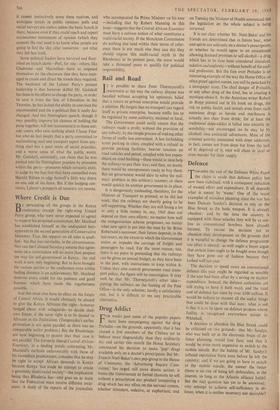Drug Addict
Fon weeks past some of the popular papers have been campaigning against the drug Preludin—on the grounds, apparently, that it has caused a few members of the Chelsea set to behave more disgracefully than they ordinarily do; and earlier this month the Home Secretary announced his decision to make 'pep' drugs available only on a doctor's prescription. But Mr. Francis Noel-Baker's own pep-group in the House of Commons, the 'Advertising Inquiry Com- mittee,' has urged still more drastic action; it wants the Government to forbid chemists to sell without a prescription any product 'containing a drug which has any effect on the nervous system, whether stimulant, sedative, or euphoriant; and on Tuesday the Minister of Health announced that the legislation on the whole subject is being reviewed.
It is not clear whether Mr. Noel-Baker and his friends are determined that in future beer, wine and spirits are sold only on a doctor's prescription; or whether he would agree to an amendment allowing licensed premises to sell alcohol—a drug which has in its time been considered Stimulant, sedative and euphoric—without benefit of the med- ical profession. But the fuss over Preludin is an interesting example of the way the Home Office, so often proof against reason, can still be panicked by a newspaper stunt. The chief danger of Preludin, or any other drug of the kind, lies in creating a mystique about it. As the American writer Robert de Ropp pointed out in his book on drugs, the risk to public health and morals even from such notorious drugs as heroin and marihuana is actually less than from drink; for at least the traditional dope-addict is lulled into amiable in- sensibility—not encouraged (as he may be by alcohol) into antisocial adventures. Most of the criminal activity associated with dope addiction, in fact, conies not from dope but from the lack of it; deprived of it, men will cheat or steal or even murder for their supply.






































 Previous page
Previous page